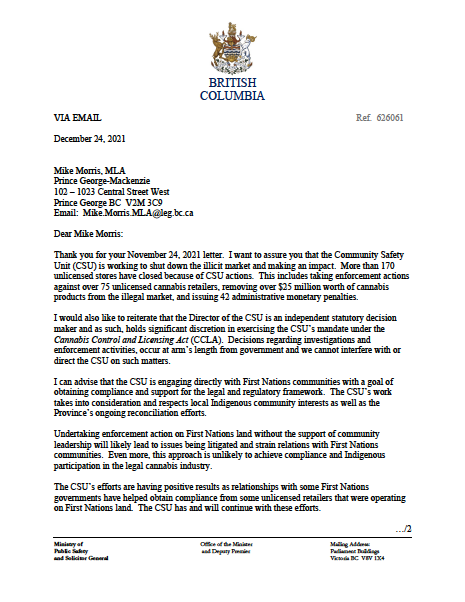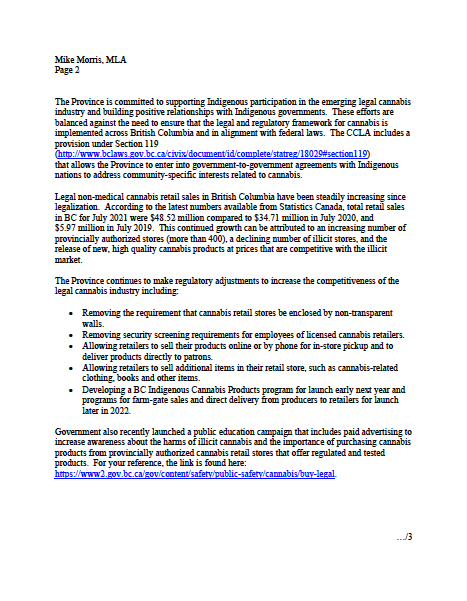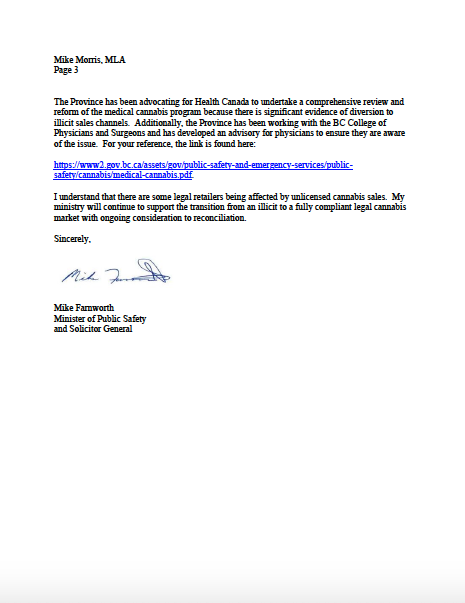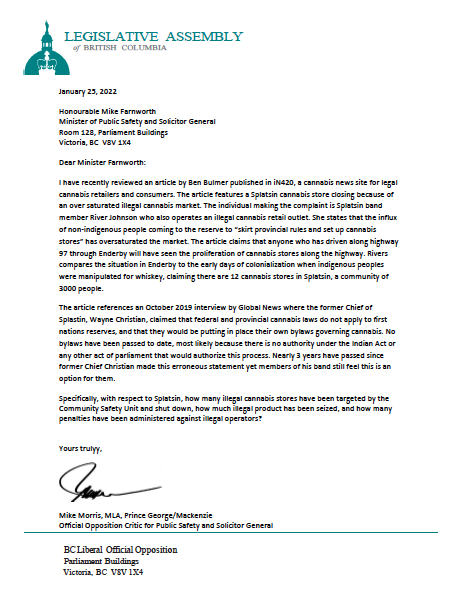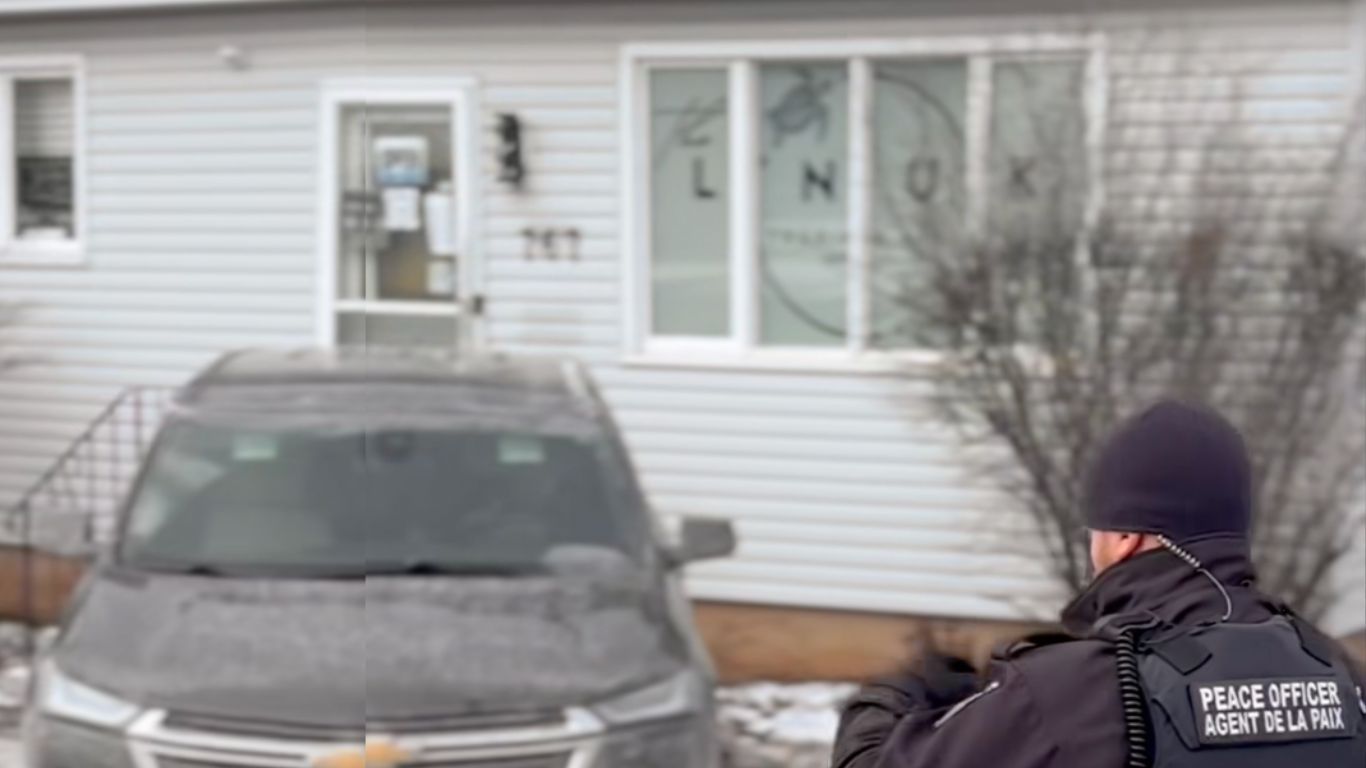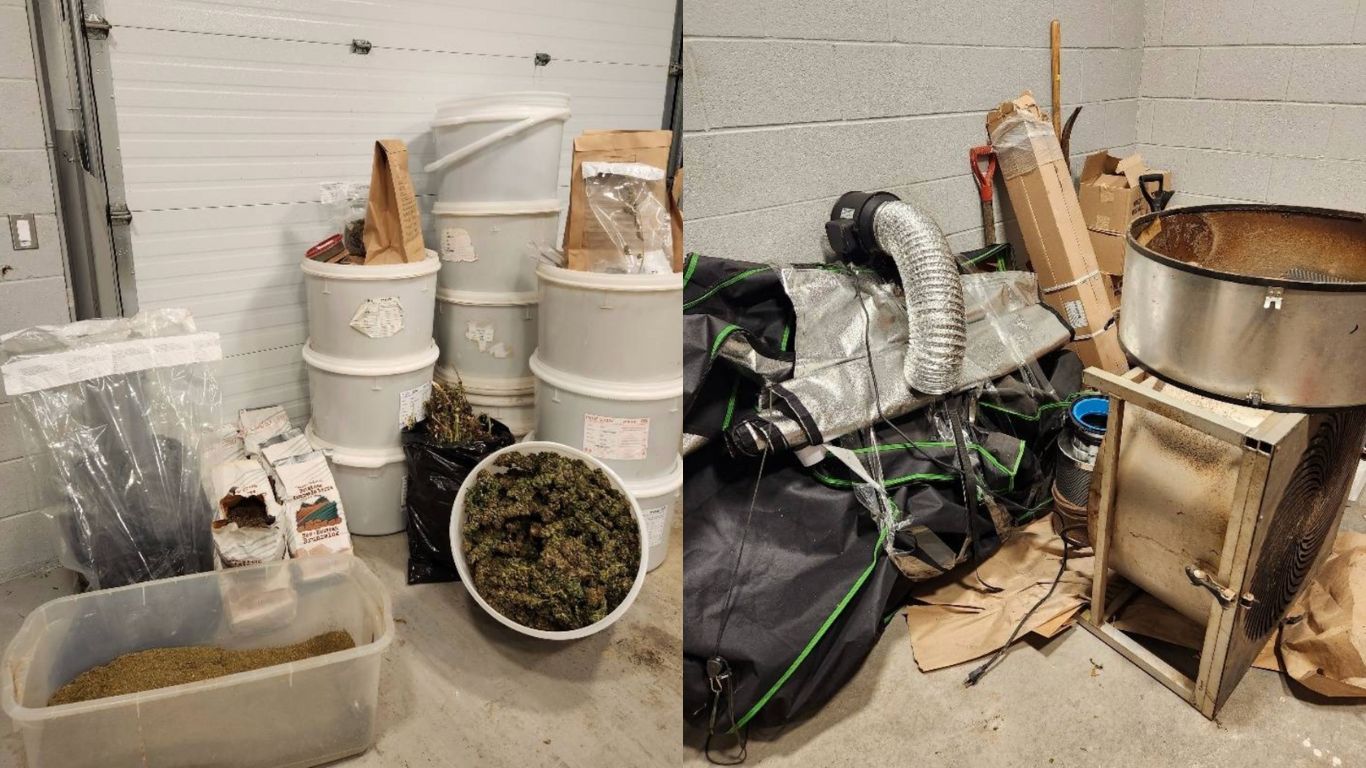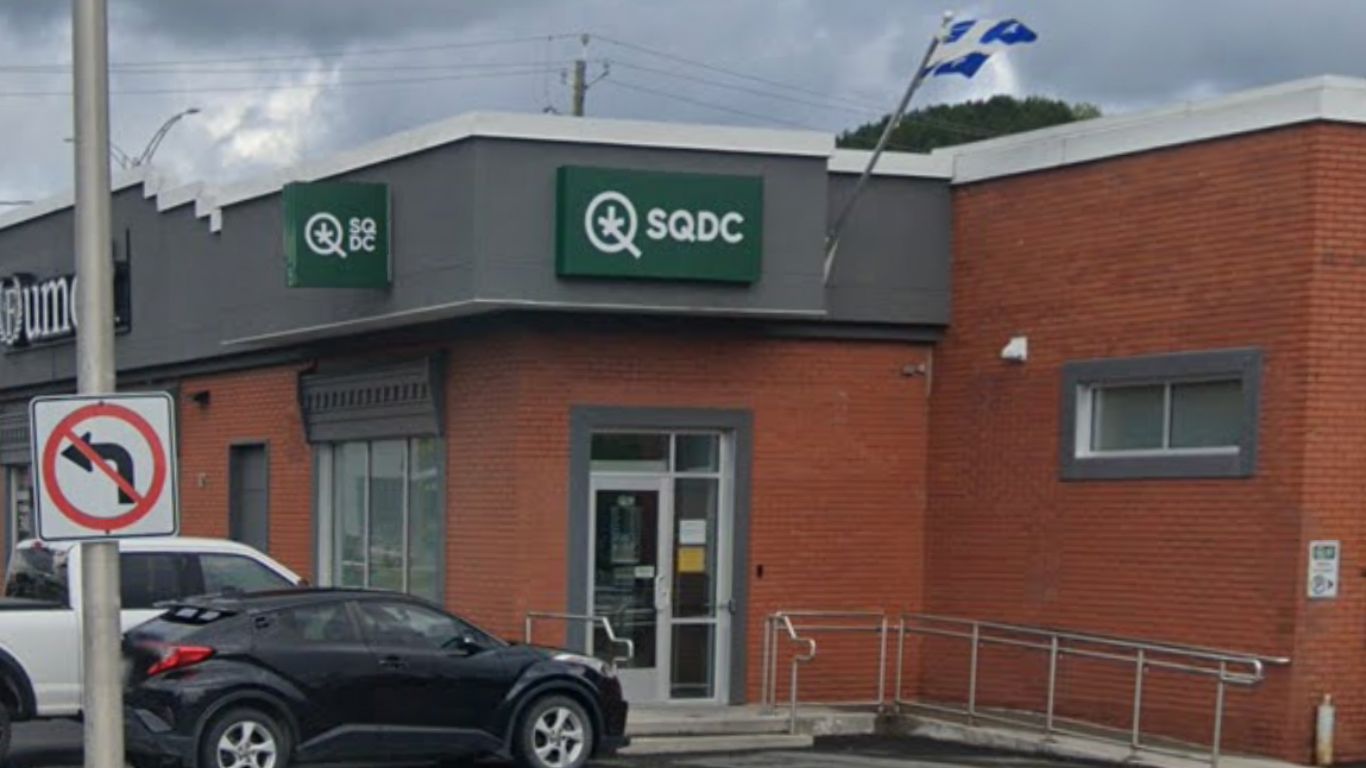
Mike Morris, the BC MLA for Prince George/Mackenzie, and the official opposition critic for Public Safety and Solicitor General is again asking the BC government for information on their enforcement practices for provincial cannabis regulations.
In a letter sent to Mike Farnworth, BC’s Minister of Public Safety and Solicitor General and the province’s lead on the cannabis file, Morris referenced recent media coverage of a cannabis retailer in the First Nations community of Splatsin, near Enderby, BC.
The owner of High Status Cannabis and a member of the Splatsin First Nation, River Setatkwa Johnson, recently shared her concerns with local media about a number of cannabis stores opening in her community that she says have no ties to the local community.
Due to the proliferation of at least ten new cannabis stores in her town of fewer than 3,000 people, Johnson says she is being forced to close her own store, despite being the first to open in the community.
Outsiders with no connection to her First Nation are taking advantage of a lack of enforcement of both the Splatsin community, as well as the BC government. Although Johnson says the BC government has no authority to enforce provincial laws on First Nations land, she notes that “outsiders” take advantage of this lack of enforcement, bringing in a “criminal element” to her community.
In an interview with StratCann, Morris says he’s seen similar problems with organized crime gaining a foothold in some First Nations communities in regard to tobacco sales, especially in eastern Canada. His concern is that BC’s approach to lax enforcement of cannabis rules could lead to the same thing.
“We’re seeing the same thing here,” says Morris. ‘By overlooking this and letting it go on, basically, the government is giving their consent for this to happen.”
“The continued blind eye to these kinds of activities on First Nations communities is blurring the goalposts,” he continues. “There may be people who want to comply with the law but they see they can get away without having to go through all the hoops and hurdles, they’re going to go ahead and take that easy route.”
In his letter to Minister Farnworth, the Prince George MLA asks how many stores in the community have been targeted by BC’s Community Safety Unit—the provincial agency tasked with enforcement of provincial cannabis regulations—as well as how many stores have been closed down, how much product has been seized, and how many penalties have been levied.
Morris has challenged the BC government and Farnworth on the topic in the past.
In response to Morris’ letter, Minister Farnworth posted his own letter, arguing that enforcement of provincial laws in First Nations communities could lead to litigation.
“Undertaking enforcement action on First Nations land without the support of community leadership will likely lead to issues being litigated and strain relations with First Nations communities,” wrote Farnworth. “Even more, this approach is unlikely to achieve compliance and Indigenous participation in the legal cannabis industry.”
Morris questions this reasoning, though.
“I don’t understand what the issue is….Even before a law gets to debate and is passed by the legislature in Parliament, it goes through a rigorous legal review to make sure it’s in compliance with the Constitution, the Charter, everything. So if he now is drawing that into question and saying ‘we don’t want to do this because it could lead to a court case’, then isn’t he questioning the validity of the laws his government has passed?”
“If he now is drawing that into question and saying ‘we don’t want to do this because it could lead to a court case’, then isn’t he questioning the validity of the laws his government has passed?”
Mike Morris, BC MLA for Prince George/Mackenzie and the official opposition critic for Public Safety and Solicitor General
The BC Community Safety Unit (CSU) is tasked with enforcing the province’s cannabis regulations, especially in the retail system. In the first few years of legalization, the CSU largely focussed on education and issuing warning letters to non-compliant retailers, although it has issued some large fines in some cases.
Although the focus in the past year has pivoted more to enforcement and even product seizures, Minister Farnworth has in the past also said his government has been hesitant to enforce BC’s cannabis rules and regulations on First Nations land out of fear of a court challenge.
Instead, he has noted the provincial government has been engaging in an open dialogue with First Nations community members.
“The CSU’s approach with respect to unlicensed cannabis retail stores operating on First Nations reserve and treaty lands prioritizes education and awareness with community leadership (Chief and Council),” Minister Farnworth told StratCann last year. “The CSU meets with leadership to provide information on the CCLA [Cannabis Control and Licensing Act], the importance of the provincial cannabis licensing framework and CSU activities.”
Instead, the BC government has been seeking to encourage First Nations communities to work with provincial regulators through special agreements called Section 119 agreements, named after the section of BC’s Cannabis Act that allows the government to engage with First Nations communities.
The issue of jurisdictional control over federal and provincial cannabis regulations on First Nations lands is an ongoing challenge for all parties involved. Many First Nations communities have stated their desire to control cannabis on their lands in their own ways, with some even implementing their own regulations. Provincial and federal governments tend to encourage regulations that work in concert with their own regimes, while some Indigenous Canadians argue they can operate outside the boundaries of those jurisdictions.
“Just as with some other issues, First Nations have said, ‘No. These are areas of our jurisdiction,’ and that’s both at the provincial level and at the federal level,” Farnworth said in 2020.
“…On numerous occasions, these are often tested in court, sometimes with a decision that, yes, they do come under First Nations jurisdiction, and that has far-reaching effects. When you have an issue where there is a dispute over jurisdiction, as a number of First Nations have indicated,” continues Farnworth, “it is their view that cannabis comes under their jurisdiction – this is a complex and complicated situation. It is something that has not just arisen. It has been around for a while, and we are working with First Nations to be able to deal with that. It’s why one of the ways in which we are encouraging legal production or legal retail is through the use of Section 119 agreements under the Act, which were designed to do just that.”
“Undertaking enforcement action on First Nations land without the support of community leadership will likely lead to issues being litigated and strain relations with First Nations communities”
Mike Farnworth, BC’s Minister of Public Safety and Solicitor General and the province’s lead on the cannabis file
Numerous First Nations communities in BC and across Canada have taken a “sovereign” approach to manage cannabis in their community, often arguing federal and provincial laws do not apply on their land. There are more than 265 other “sovereign” Indigenous dispensaries in Canada according to one organization.
Many governments have taken a hands-off approach similar to BC when it comes to enforcement, for a host of reasons. Some say they will only enter communities at the request of the local Chief and Councils. At times, elected councils will clash with hereditary leaders within the community over issues of jurisdiction around cannabis regulations, as well.
Recently, in New Brunswick, Finance Minister Ernie Steeves dodged questions from members of the opposition during a meeting of the Standing Committee on Economic Policy when asked about similar provincial cannabis laws jurisdiction issues in relation to First Nations land.
Although Steeves, like Farnworth, maintains provincial law applies even in these First Nations communities, he avoided directly answering questions about enforcement using that authority, referring instead to “jurisdictional issues that will require special consideration”.
Steeves says that of the 113 illicit retail cannabis stores in the province, about half of them are on First Nations land.
The hands-off approach in BC has led to some areas being inundated with retailers operating on First Nations land and outside of the province’s own cannabis regulations. Recently an organization made up of several regulated cannabis stores in the province accused the province of mismanagement of the cannabis file, releasing a map noting the location of numerous unlicensed retailers operating in BC.
Although Johnson at High Status in Splatsin says she’s frustrated by a lack of enforcement by her own First Nations counsel, she maintains the province has no jurisdiction and is not seeking provincial enforcement.
“They (the BC government) absolutely have no authority or jurisdiction on our land.”
“Why not make it Splatsin laws for Splatsin lands? Why do we have to do what everybody else does?”
“I didn’t want the criminal activity or the criminal elements coming into our community,” she continues. “These are the concerns I had when I opened my shop and I went to my leadership and talked to them about that.”
“I offered my help, my time, but here we are. A town of 2,965 with twelve dispensaries in it.”

